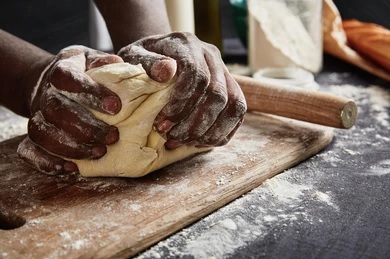
“And he said to them another parable. The kingdom of heaven is like unto SOURDOUGH STARTER. A woman takes it into three sa’aym of flour and causes all of it it to be RISEN BREAD” (Mathath-Ya’oh 13:33).
Paul’s claim that sourdough starter is symbolic of sin, in his satanic letter 1 Corinthians 5:7-8, is absurd since Thorah allows us to consume it every day of the year except for the seven days of Pasakh. And the ONLY reason we are commanded to abstain from it during Pasakh is so that we reenact the experience of leaving Matsraym in such a hurry in the first Exodus that we did not have time to make our bread for the journey properly. That’s the only reason. We can enjoy it to our heart’s content throughout the year except for the days of Pasakh.
The sa’ah is a measure for flour and cereals. One sa’ah is one-third of an aypah. The aypah is a receptacle for containing dry goods like flour and cereals. In prophecy the aypah is the container with a lid on the cover and a woman inside which is lifted into the air and flown off to Shanair (lit. ‘that which is nascent’) where the woman is then able to establish her own base (Zachar-Ya’oh [Zechariah] 5:6).
Parable breakdown: The woman is the sourdough starter (sha’ar) which is flour and water that has been allowed to naturally ferment. The period of our curses is supposed to last three days and in the third day we are to be raised up again (Hoshai 6:1-2). These three days are what the three sa’aym of flour represent. Kneading the sourdough starter with flour is a long and tedious period of work done by hand, but it is also a crucial step that cannot be skipped in the bread making process. The remnant has been thoroughly kneaded into soft dough over the last “two days” (2,000 years) and is now preparing to start to rise in this “third day” (third millennium) to become risen bread. But this transformation into risen bread cannot happen until the woman has been flown to the wilderness where she will have her own base, i.e. a land of her own.
The messiah our brother was telling his people way back then, with this simple yet packed with information parable, when and where they could expect the kingdom of YA’OH to be re-established on earth. The kingdom of YA’OH was first established in the wilderness where the tabernacle was reared up by Mashah (Moses). The kingdom of YA’OH will be re-established in the second wilderness where the tabernacle will be reared up once again. Full circle, the great reset.
Note that an aypah receptacle holds three sa’aym of flour which is enough flour to make a great deal of risen bread cakes. We ask our Father in heaven for bread perpetually, and He commands us to put the “bread of the face” (shewbread) on His table in His tabernacle every shabath day (Thorah 2 [Exodus] 25:30). That’s twelve new bread cakes on His table every shabath day of the year without fail (Thorah 3 [Leviticus] 24:5-9).
The first cannot be done unless our Ala’aym is an all-powerful Supreme Being. The second cannot be done unless the all-powerful Ala’aym has raised His people up from nothing to become obscenely wealthy and prosperous. Real wealth is not our own house in the Hamptons. Real wealth is His house among us and our ability to keep His covenant exactly as He commands it to be kept every day of every year. He will give us power to obtain great material wealth, but that great wealth He will give to us will be used to establish His covenant (Thorah 5 [Deuteronomy] 8:18). It will not be wasted on foolishness.
His name is YA’OH
Always has been. Always will be.
#EXODUS2023
1.15.7252

This is definitely and Eye opening lesson AKH’AY RAVENOUS. I’m really starting to see, feel, and Understand things I should have OVERSTAND years ago feel me. Damn sometimes I just can’t believe how stupid and lost I really was. As always I’m appreciative for you AKH’AY sharing this BIBLICAL HISTORICAL Mighty good Meal with me and the MASHPAKHATAY. SHALOM.
Aman Wa Aman for our eyes being opened to our truth and YA’OHs and his commandments for us to follow. Our brother Ya’ohshai gave parables to make it better for us to understand ourselves through works regarding our duties to please YA’OH and nothing else. Our wealths will come by our obedience’s unto YA’OH and by his say so of whom he shall give wealth unto.